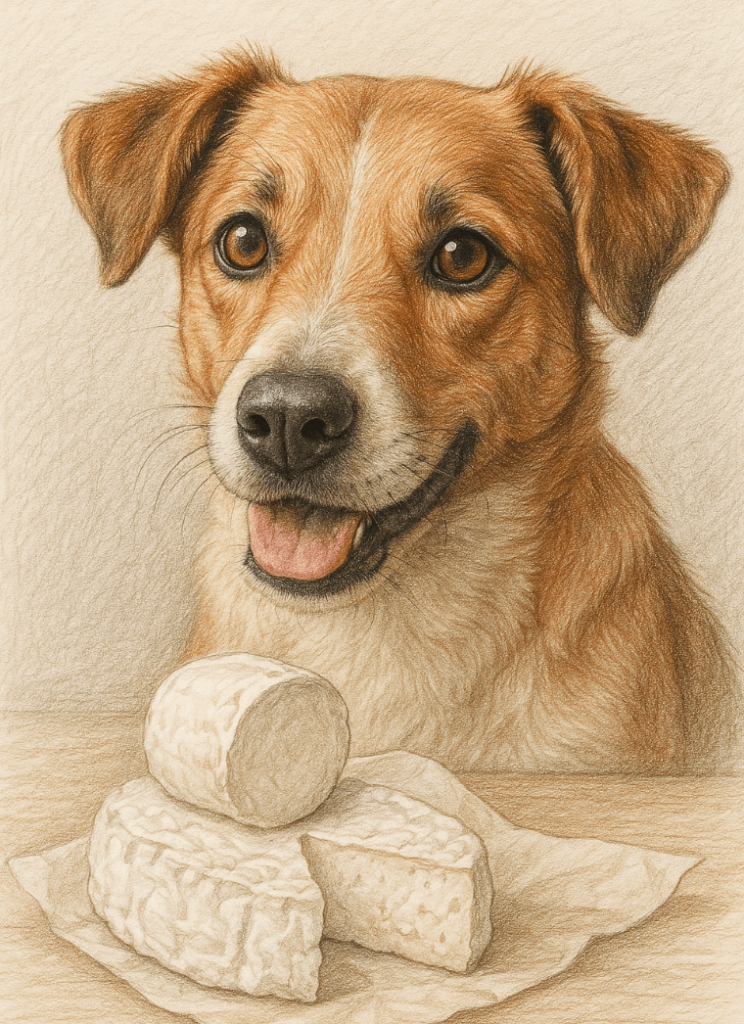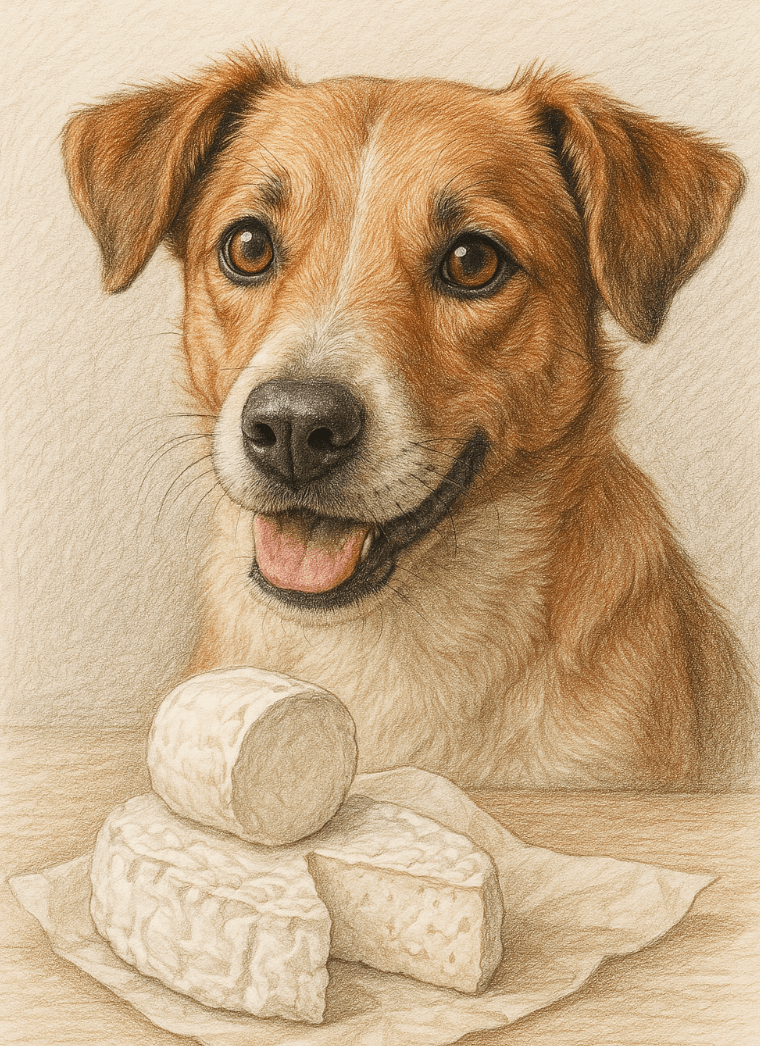Can Dogs Eat Goat Cheese?
When it comes to treating our furry friends, many dog owners wonder whether goat cheese is a safe and healthy option. Goat cheese has gained popularity among humans for its rich flavor and potential health benefits, but can dogs enjoy it too? While some cheeses are generally safe for dogs in moderation, others may pose risks due to their ingredients or nutritional content. In this blog post, we’ll explore whether goat cheese is a suitable treat for your pup, its potential benefits, and what precautions you should take to ensure your dog’s safety. Whether you’re considering adding goat cheese to your dog’s diet or simply curious about its effects, this guide will provide all the answers you need.
Potential Benefits of Goat Cheese for Dogs
Goat cheese can offer certain advantages when fed in moderation, making it an appealing option for dog owners looking to diversify their pet’s treats. However, it’s essential to understand how these benefits align with your dog’s dietary needs.
Easier Digestibility:
Goat cheese contains smaller fat molecules and less lactose than cow’s milk cheese, making it easier for some dogs to digest.Rich in Nutrients:
It provides essential nutrients like calcium, phosphorus, and vitamin A, which support bone health and overall vitality.Probiotic Properties:
Some goat cheeses contain beneficial bacteria that may aid digestion and promote gut health.High-Quality Protein:
Goat cheese is a good source of protein, which helps maintain muscle mass and supports energy levels.Low Allergenic Potential:
Compared to cow’s milk products, goat cheese is less likely to trigger allergies in sensitive dogs.
While these benefits make goat cheese a tempting treat, moderation and careful monitoring are key to avoiding potential downsides.
Risks of Feeding Goat Cheese to Dogs
Although goat cheese has its merits, it also comes with risks that every dog owner should be aware of before offering it to their pet. Understanding these hazards ensures your dog stays safe and healthy.
High Fat Content:
Goat cheese is calorie-dense and high in fat, which can lead to obesity or pancreatitis if consumed excessively.Lactose Sensitivity:
Even though it contains less lactose than cow’s milk cheese, some dogs may still experience digestive upset from goat cheese.Salt Levels:
Many varieties of goat cheese contain added salt, which can be harmful to dogs in large amounts.Risk of Choking:
Large chunks or improperly portioned pieces may pose a choking hazard, especially for small breeds.Allergic Reactions:
While rare, some dogs may develop allergic reactions such as itching, swelling, or gastrointestinal issues after consuming goat cheese.
Being mindful of these risks allows you to make informed decisions about incorporating goat cheese into your dog’s diet.
Check this guide 👉Can Dogs Eat Coconut Milk? Best 7 Expert Tips!
Check this guide 👉Can Dogs Eat Plantains? Best 7 Expert Tips!
Check this guide 👉Can Dogs Eat Rhubarb? Best 7 Expert Tips!

Safe Alternatives to Goat Cheese | Risks of Unsafe Cheese Choices |
|---|---|
Plain yogurt (unsweetened) | Cheeses with added garlic or onions |
Cottage cheese (low-fat) | High-sodium cheeses like feta or blue |
Small amounts of plain mozzarella | Processed cheeses with artificial additives |
Boiled chicken or turkey slices | Moldy or spoiled cheeses |
Pumpkin puree | Full-fat cream cheese or brie |
How to Safely Introduce Goat Cheese to Your Dog
If you decide to share goat cheese with your dog, it’s crucial to do so safely to avoid any adverse effects. Follow these guidelines to ensure a positive experience.
Start with Small Portions:
Offer only a tiny amount initially to see how your dog reacts before giving more.Choose Unflavored Varieties:
Avoid flavored or seasoned goat cheese, as additives like herbs or spices can upset your dog’s stomach.Monitor for Digestive Issues:
Watch for signs of diarrhea, vomiting, or bloating after introducing goat cheese.Limit Frequency:
Treats like goat cheese should make up no more than 10% of your dog’s daily caloric intake.Consult Your Veterinarian:
Always seek professional advice, especially if your dog has underlying health conditions or dietary restrictions.
By following these steps, you can minimize risks while allowing your dog to enjoy a new and tasty treat.
Signs Your Dog May Not Tolerate Goat Cheese
Even if goat cheese seems safe, some dogs may not tolerate it well. Recognizing these warning signs allows you to act quickly and prevent further complications.
Upset Stomach:
Symptoms like vomiting, diarrhea, or excessive gas indicate digestive discomfort.Lethargy or Weakness:
A sudden lack of energy could signal an adverse reaction to the cheese.Itching or Skin Irritation:
Allergic reactions often manifest as scratching, redness, or swelling around the face or paws.Difficulty Breathing:
Severe allergic reactions may cause labored breathing or wheezing, requiring immediate veterinary attention.Loss of Appetite:
If your dog refuses food after eating goat cheese, it may indicate nausea or irritation.
Identifying these signs early ensures prompt intervention and keeps your dog safe.
Common Mistakes to Avoid When Feeding Goat Cheese
Feeding goat cheese to your dog requires careful planning to avoid mistakes that could harm their health. Here are some pitfalls to watch out for.
Overfeeding:
Giving too much goat cheese can lead to weight gain or digestive upset. Stick to small portions.Choosing Flavored Varieties:
Flavored goat cheese often contains ingredients like garlic or onion powder, which are toxic to dogs.Ignoring Underlying Conditions:
Dogs with pancreatitis or obesity should avoid fatty foods like goat cheese entirely.Not Monitoring Reactions:
Failing to observe how your dog responds can result in missed warning signs of intolerance.Leaving Cheese Accessible:
Leaving goat cheese within reach can tempt your dog to overindulge, leading to potential health issues.
Avoiding these mistakes ensures a safer and healthier experience for your dog.
Alternative Treats for Dogs Who Can’t Have Goat Cheese
If goat cheese isn’t suitable for your dog, there are plenty of alternatives that provide similar benefits without the associated risks.
Cooked Vegetables:
Carrots, green beans, or zucchini make excellent low-calorie snacks packed with vitamins and fiber.Lean Meats:
Boiled chicken, turkey, or beef strips offer protein without added fats or lactose.Fruit Snacks:
Apples (without seeds), blueberries, or bananas provide natural sweetness and nutrients.Plain Yogurt:
Unsweetened yogurt supplies probiotics and calcium without the high fat content of goat cheese.Homemade Treats:
DIY dog treats using oats, peanut butter, and pumpkin puree are both healthy and customizable.
These alternatives allow you to cater to your dog’s palate while keeping them safe.
Understanding Your Dog’s Dietary Needs
Every dog has unique dietary requirements based on factors like age, breed, size, and activity level. Understanding these needs helps you determine whether goat cheese fits into their diet.
Age Considerations:
Puppies and senior dogs have different nutritional needs; younger dogs require more protein, while older ones benefit from lower-fat options.Breed Size Differences:
Smaller breeds may struggle with high-calorie foods, while larger breeds need nutrient-rich diets to support joint health.Activity Levels:
Highly active dogs burn more calories and may tolerate occasional treats better than sedentary pets.Health Conditions:
Dogs with diabetes, kidney disease, or allergies require tailored diets to manage their conditions effectively.Portion Control:
Even healthy treats should be given sparingly to prevent overeating and maintain a balanced diet.
By tailoring your approach to your dog’s specific needs, you can ensure they thrive on a diet that works for them.
Frequently Asked Questions About Dogs and Goat Cheese
Is goat cheese healthier for dogs than other cheeses?
Yes, its lower lactose and fat content make it a better choice than many cow’s milk cheeses, but moderation is still essential.
Can puppies eat goat cheese?
Puppies have sensitive digestive systems, so it’s best to consult your vet before introducing goat cheese or any new food.
What type of goat cheese is safest for dogs?
Plain, unflavored goat cheese with no added salt or spices is the safest option.
How much goat cheese can I give my dog?
Limit treats to 10% of your dog’s daily calories; a teaspoon or two is usually sufficient for most dogs.
What should I do if my dog eats too much goat cheese?
Contact your veterinarian immediately if your dog shows signs of illness or distress after consuming large amounts.
Making Smart Choices for Your Dog’s Diet
Goat cheese can be a tasty and nutritious treat for dogs when offered in moderation and prepared safely. However, it’s important to weigh the potential benefits against the risks and always prioritize your dog’s individual needs. By understanding their tolerance, choosing appropriate portions, and consulting your veterinarian, you can ensure your pup enjoys a varied and balanced diet. Remember, treats like goat cheese should complement—not replace—a nutritionally complete meal plan. With care and consideration, you can indulge your dog responsibly while keeping them happy and healthy.
Do Cats Have Taste Buds? Best 7 Expert Tips! – Discover how cats experience flavors and why their taste is so unique.
Do Dogs Have Taste Buds? Best 7 Expert Tips! – Discover how dogs experience taste, their preferences, and what it means for their diet and health.
Can Cats Taste Sweet? Best 7 Expert Tips! – Discover why cats can’t taste sweetness, how it affects their diet, and tips to keep them healthy and happy.
Can Dogs Taste Sweet? Best 7 Expert Tips! – Discover how dogs perceive sweetness, which foods are safe, and tips to manage their sweet cravings responsibly.





